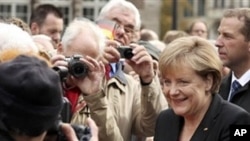Two decades ago on Sunday, Germany ended its East-West divide and reunified as one country, after more than forty years of separation.
German President Christian Wulff praised Russia, Poland and Hungary for supporting Germany during its reunification process. He also singled out former U.S. President George H.W. Bush for his role in uniting Germany.
"We will not forget the support for unification from George Bush. For all of this, we are eternally grateful. Germany as a whole was able to become an equal member of the international community again," he said.
The German government held the official reunification celebration in the northern German city of Bremen.
Each year the commemoration is held in a different part of Germany to symbolize the nation's unity. Mr. Wulff recognized that at the time of reunification in 1990, some people were concerned that Germany country might become strong again. "Especially abroad, a lot of people were asking whether it was a good thing if Germany was doing well again. Who could have blamed them, after the horrors and catastrophes originating in Germany during the first half of the 20th century," he said.
When the bubble of communism burst, the system that had governed East Germany was swept away virtually overnight. The laws and economics of the West and capitalism took over.
German President Christian Wulff says East Germans paid a heavy price. "It was the East Germans who by far carried the heaviest weight on the path toward the unification of our country. They, in some ways, had to start their lives all over again. They needed to rearrange their daily lives, take advantage of opportunities. And they did it with an incredible readiness to accept change. To this day, this has not been honored enough," he said.
Angela Gehring was a 10 year old East German when the country reunified. She says there is a big difference now. "Now the difference between East and West Germany? I think it's still money, and also partly the attitude of people. There was more solidarity between people, we were living more together," she said.
Historian Juliane Schutterle says mistakes might have been made during the transition, but that is understandable. "In 1989, there was a small window of opportunity and our chancellor, Helmut Kohl, had to use this window of opportunity. And anything was so exciting and so fast, and they had to make fast decisions. And there were a lot of things going wrong, but I don't know if anyone could have changed it," she said.
There are still economic and social divisions here. But 20 years after reunification, many Germans no longer think of the country in terms of East and West, but as one nation that survived a peaceful revolution and has retaken its place as a leader in Europe.




